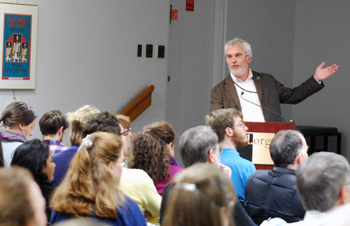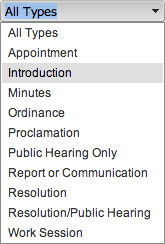Ann Arbor city staff and others involved in resource management – water, solid waste, the urban forest and natural areas – spoke to a crowd of about 100 people on Jan. 12 to highlight work being done to make the region more environmentally sustainable.

Matt Naud, Ann Arbor's environmental coordinator, moderated a panel discussion on resource management – the topic of the first in a series of four sustainability forums, all to be held at the Ann Arbor District Library. (Photos by the writer.)
It was the first of four public forums, and part of a broader sustainability initiative that started informally nearly two years ago, with a joint meeting of the city’s planning, environmental and energy commissions. The idea is to help shape decisions by looking at a triple bottom line: environmental quality, economic vitality, and social equity.
In early 2011, the city received a $95,000 grant from the Home Depot Foundation to fund a formal sustainability project. The project’s main goal is to review the city’s existing plans and organize them into a framework of goals, objectives and indicators that can guide future planning and policy. Other goals include improving access to the city’s plans and to the sustainability components of each plan, and to incorporate the concept of sustainability into city planning and future city plans.
In addition to city staff, this work has been guided by volunteers who serve on four city advisory commissions: Park, planning, energy and environmental. Many of those members attended the Jan. 12 forum, which was held at the downtown Ann Arbor District Library.
The topics of the forums reflect four general themes that have been identified to shape the sustainability framework: Resource management; land use and access; climate and energy; and community. The Jan. 12 panel on resource management was moderated by Matt Naud, the city’s environmental coordinator. Panelists included Laura Rubin, executive director of the Huron River Watershed Council (and a member of the city’s greenbelt advisory commission); Kerry Gray, the city’s urban forest and natural resource planning coordinator; Jason Tallant of the city’s natural area preservation program; Tom McMurtrie, Ann Arbor’s solid waste coordinator, who oversees the city’s recycling program; and Chris Graham, chair of the city’s environmental commission.
Dick Norton, chair of the University of Michigan urban and regional planning program, also participated by giving an overview of sustainability issues and challenges that local governments face. [The university has its own sustainability initiative, including broad goals announced by president Mary Sue Coleman last fall.]
The Jan. 12 forum also included opportunities for questions and comments from the audience. That commentary covered a wide range of topics, from concerns over Fuller Road Station and potential uses for the Library Lot, to suggestions for improving the city’s recycling and composting programs. Even the issue of Argo Dam was raised. The controversy over whether to remove the dam spiked in 2010, but abated after the city council didn’t vote on the question, thereby making a de facto decision to keep the dam in place.
Naud said he’s often joked that the only sure way to get 100 people to come to a meeting is to say the topic is a dam – but this forum had proven him wrong. The city is interested in hearing from residents, he said: What sustainability issues are important? How would people like to be engaged in these community discussions?
The forum was videotaped by AADL staff and will be posted on the library’s website. Additional background on the Ann Arbor sustainability initiative is on the city’s website. See also Chronicle coverage: “Building a Sustainable Ann Arbor,” and an update on the project given at the November 2011 park advisory commission meeting. [Full Story]





